Analysis of Employment Law Case Studies with Detailed Answers
VerifiedAdded on 2019/09/30
|6
|1670
|240
Case Study
AI Summary
This document presents an analysis of several employment law case studies, offering detailed answers and legal interpretations. The first case, Lawson v. Fmr LLC, examines whistle-blower protection under the Sarbanes-Oxley Act, focusing on the Supreme Court's decision regarding the definition of...
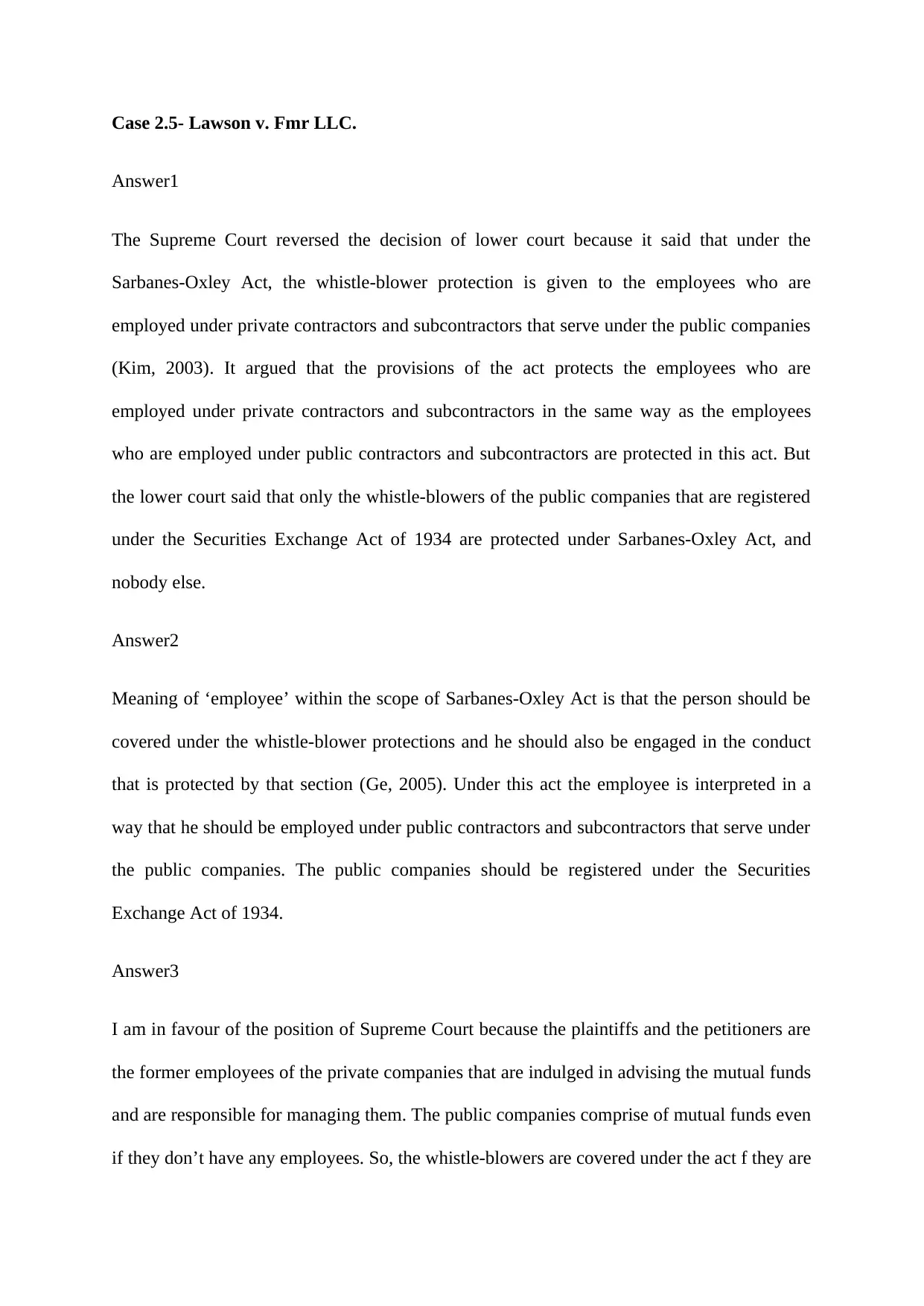
Case 2.5- Lawson v. Fmr LLC.
Answer1
The Supreme Court reversed the decision of lower court because it said that under the
Sarbanes-Oxley Act, the whistle-blower protection is given to the employees who are
employed under private contractors and subcontractors that serve under the public companies
(Kim, 2003). It argued that the provisions of the act protects the employees who are
employed under private contractors and subcontractors in the same way as the employees
who are employed under public contractors and subcontractors are protected in this act. But
the lower court said that only the whistle-blowers of the public companies that are registered
under the Securities Exchange Act of 1934 are protected under Sarbanes-Oxley Act, and
nobody else.
Answer2
Meaning of ‘employee’ within the scope of Sarbanes-Oxley Act is that the person should be
covered under the whistle-blower protections and he should also be engaged in the conduct
that is protected by that section (Ge, 2005). Under this act the employee is interpreted in a
way that he should be employed under public contractors and subcontractors that serve under
the public companies. The public companies should be registered under the Securities
Exchange Act of 1934.
Answer3
I am in favour of the position of Supreme Court because the plaintiffs and the petitioners are
the former employees of the private companies that are indulged in advising the mutual funds
and are responsible for managing them. The public companies comprise of mutual funds even
if they don’t have any employees. So, the whistle-blowers are covered under the act f they are
Answer1
The Supreme Court reversed the decision of lower court because it said that under the
Sarbanes-Oxley Act, the whistle-blower protection is given to the employees who are
employed under private contractors and subcontractors that serve under the public companies
(Kim, 2003). It argued that the provisions of the act protects the employees who are
employed under private contractors and subcontractors in the same way as the employees
who are employed under public contractors and subcontractors are protected in this act. But
the lower court said that only the whistle-blowers of the public companies that are registered
under the Securities Exchange Act of 1934 are protected under Sarbanes-Oxley Act, and
nobody else.
Answer2
Meaning of ‘employee’ within the scope of Sarbanes-Oxley Act is that the person should be
covered under the whistle-blower protections and he should also be engaged in the conduct
that is protected by that section (Ge, 2005). Under this act the employee is interpreted in a
way that he should be employed under public contractors and subcontractors that serve under
the public companies. The public companies should be registered under the Securities
Exchange Act of 1934.
Answer3
I am in favour of the position of Supreme Court because the plaintiffs and the petitioners are
the former employees of the private companies that are indulged in advising the mutual funds
and are responsible for managing them. The public companies comprise of mutual funds even
if they don’t have any employees. So, the whistle-blowers are covered under the act f they are
Paraphrase This Document
Need a fresh take? Get an instant paraphrase of this document with our AI Paraphraser
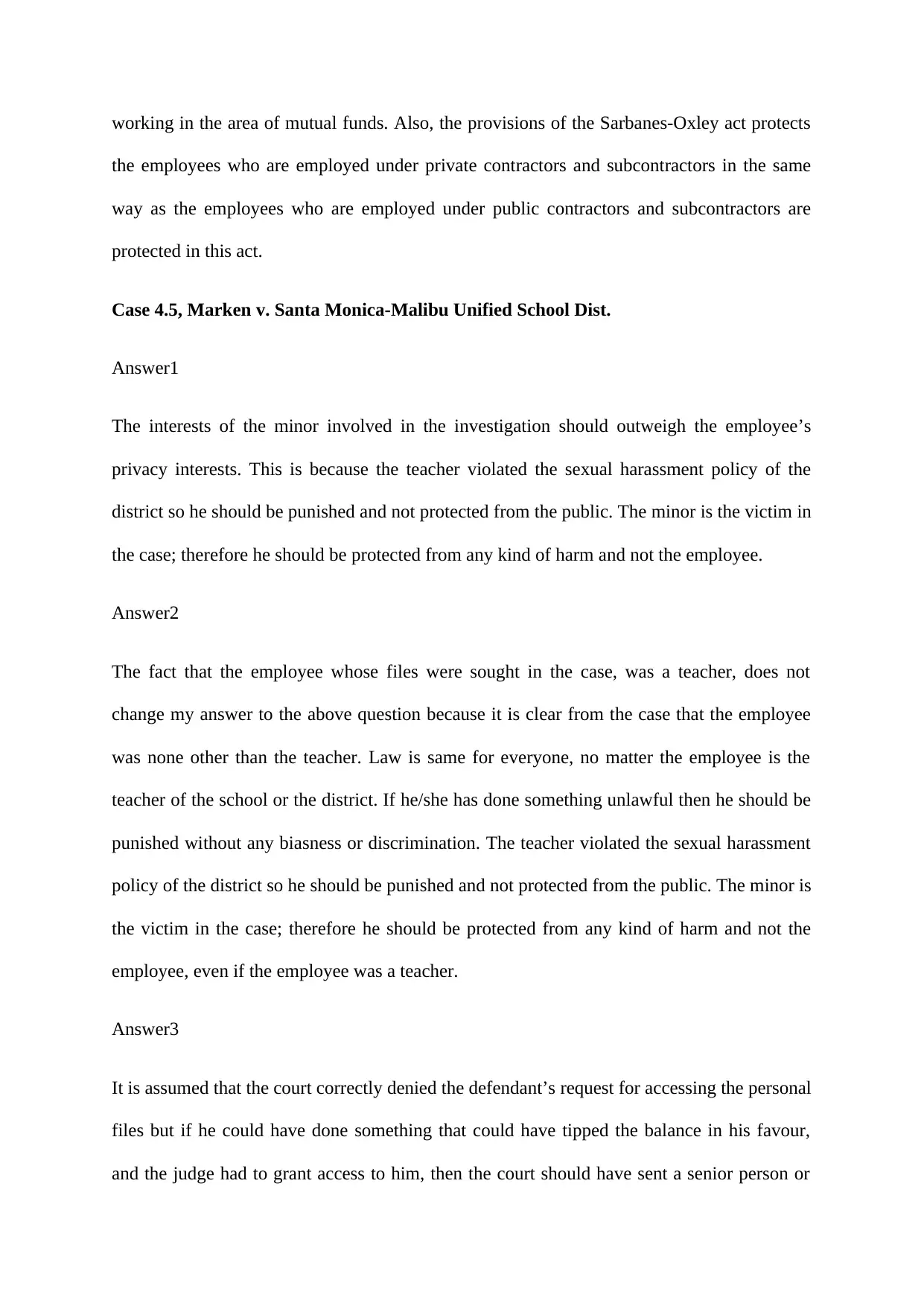
working in the area of mutual funds. Also, the provisions of the Sarbanes-Oxley act protects
the employees who are employed under private contractors and subcontractors in the same
way as the employees who are employed under public contractors and subcontractors are
protected in this act.
Case 4.5, Marken v. Santa Monica-Malibu Unified School Dist.
Answer1
The interests of the minor involved in the investigation should outweigh the employee’s
privacy interests. This is because the teacher violated the sexual harassment policy of the
district so he should be punished and not protected from the public. The minor is the victim in
the case; therefore he should be protected from any kind of harm and not the employee.
Answer2
The fact that the employee whose files were sought in the case, was a teacher, does not
change my answer to the above question because it is clear from the case that the employee
was none other than the teacher. Law is same for everyone, no matter the employee is the
teacher of the school or the district. If he/she has done something unlawful then he should be
punished without any biasness or discrimination. The teacher violated the sexual harassment
policy of the district so he should be punished and not protected from the public. The minor is
the victim in the case; therefore he should be protected from any kind of harm and not the
employee, even if the employee was a teacher.
Answer3
It is assumed that the court correctly denied the defendant’s request for accessing the personal
files but if he could have done something that could have tipped the balance in his favour,
and the judge had to grant access to him, then the court should have sent a senior person or
the employees who are employed under private contractors and subcontractors in the same
way as the employees who are employed under public contractors and subcontractors are
protected in this act.
Case 4.5, Marken v. Santa Monica-Malibu Unified School Dist.
Answer1
The interests of the minor involved in the investigation should outweigh the employee’s
privacy interests. This is because the teacher violated the sexual harassment policy of the
district so he should be punished and not protected from the public. The minor is the victim in
the case; therefore he should be protected from any kind of harm and not the employee.
Answer2
The fact that the employee whose files were sought in the case, was a teacher, does not
change my answer to the above question because it is clear from the case that the employee
was none other than the teacher. Law is same for everyone, no matter the employee is the
teacher of the school or the district. If he/she has done something unlawful then he should be
punished without any biasness or discrimination. The teacher violated the sexual harassment
policy of the district so he should be punished and not protected from the public. The minor is
the victim in the case; therefore he should be protected from any kind of harm and not the
employee, even if the employee was a teacher.
Answer3
It is assumed that the court correctly denied the defendant’s request for accessing the personal
files but if he could have done something that could have tipped the balance in his favour,
and the judge had to grant access to him, then the court should have sent a senior person or
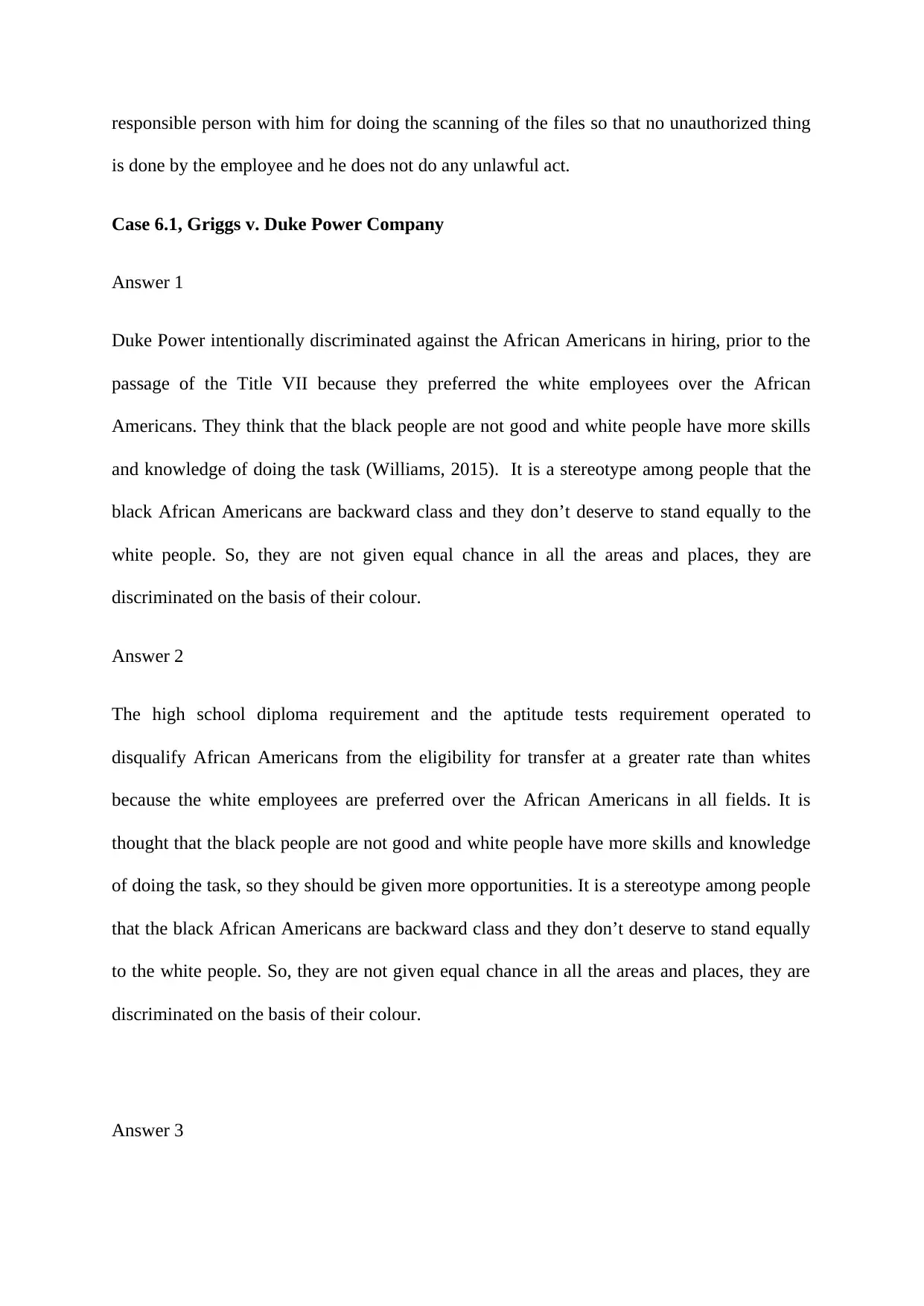
responsible person with him for doing the scanning of the files so that no unauthorized thing
is done by the employee and he does not do any unlawful act.
Case 6.1, Griggs v. Duke Power Company
Answer 1
Duke Power intentionally discriminated against the African Americans in hiring, prior to the
passage of the Title VII because they preferred the white employees over the African
Americans. They think that the black people are not good and white people have more skills
and knowledge of doing the task (Williams, 2015). It is a stereotype among people that the
black African Americans are backward class and they don’t deserve to stand equally to the
white people. So, they are not given equal chance in all the areas and places, they are
discriminated on the basis of their colour.
Answer 2
The high school diploma requirement and the aptitude tests requirement operated to
disqualify African Americans from the eligibility for transfer at a greater rate than whites
because the white employees are preferred over the African Americans in all fields. It is
thought that the black people are not good and white people have more skills and knowledge
of doing the task, so they should be given more opportunities. It is a stereotype among people
that the black African Americans are backward class and they don’t deserve to stand equally
to the white people. So, they are not given equal chance in all the areas and places, they are
discriminated on the basis of their colour.
Answer 3
is done by the employee and he does not do any unlawful act.
Case 6.1, Griggs v. Duke Power Company
Answer 1
Duke Power intentionally discriminated against the African Americans in hiring, prior to the
passage of the Title VII because they preferred the white employees over the African
Americans. They think that the black people are not good and white people have more skills
and knowledge of doing the task (Williams, 2015). It is a stereotype among people that the
black African Americans are backward class and they don’t deserve to stand equally to the
white people. So, they are not given equal chance in all the areas and places, they are
discriminated on the basis of their colour.
Answer 2
The high school diploma requirement and the aptitude tests requirement operated to
disqualify African Americans from the eligibility for transfer at a greater rate than whites
because the white employees are preferred over the African Americans in all fields. It is
thought that the black people are not good and white people have more skills and knowledge
of doing the task, so they should be given more opportunities. It is a stereotype among people
that the black African Americans are backward class and they don’t deserve to stand equally
to the white people. So, they are not given equal chance in all the areas and places, they are
discriminated on the basis of their colour.
Answer 3
⊘ This is a preview!⊘
Do you want full access?
Subscribe today to unlock all pages.

Trusted by 1+ million students worldwide
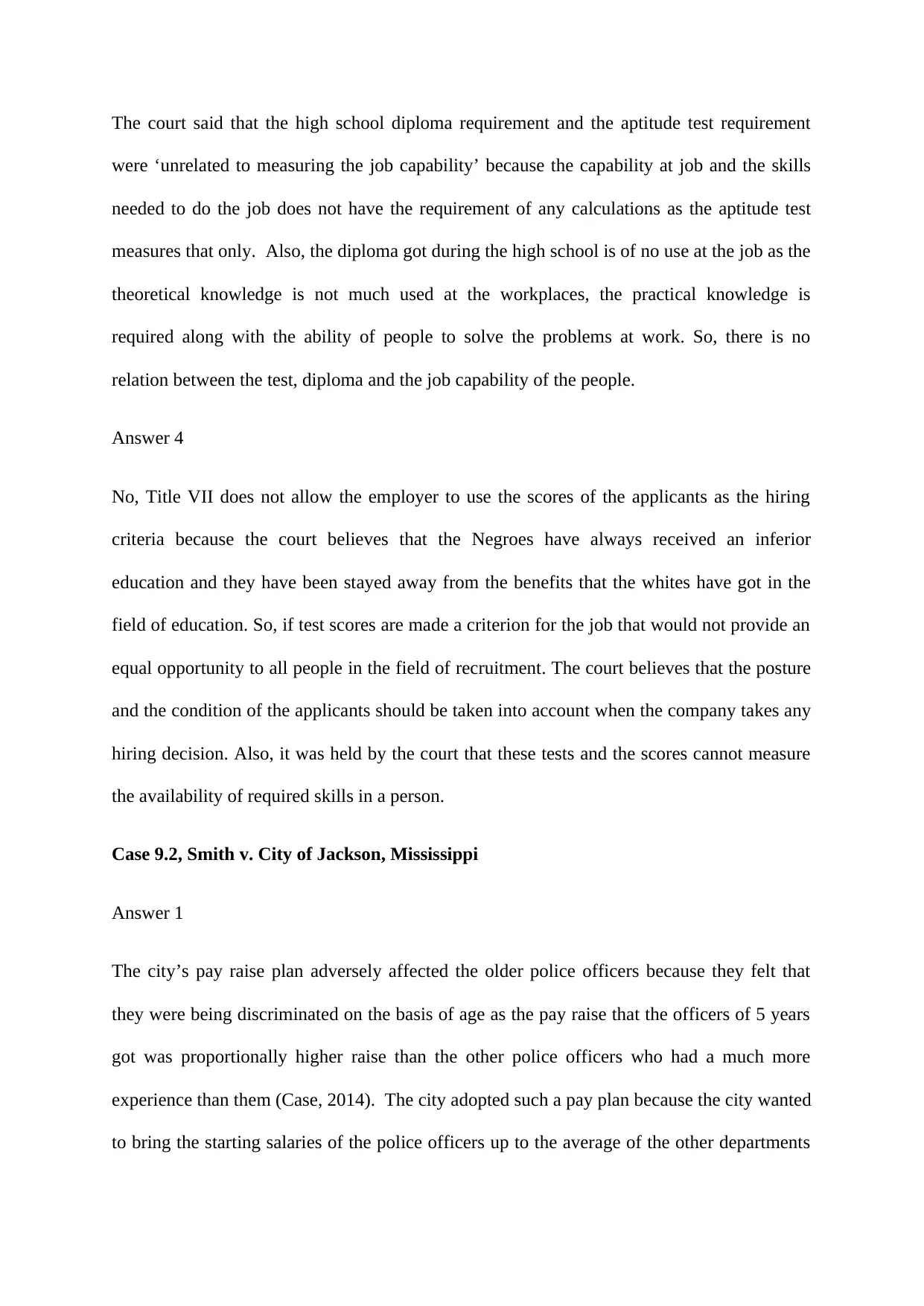
The court said that the high school diploma requirement and the aptitude test requirement
were ‘unrelated to measuring the job capability’ because the capability at job and the skills
needed to do the job does not have the requirement of any calculations as the aptitude test
measures that only. Also, the diploma got during the high school is of no use at the job as the
theoretical knowledge is not much used at the workplaces, the practical knowledge is
required along with the ability of people to solve the problems at work. So, there is no
relation between the test, diploma and the job capability of the people.
Answer 4
No, Title VII does not allow the employer to use the scores of the applicants as the hiring
criteria because the court believes that the Negroes have always received an inferior
education and they have been stayed away from the benefits that the whites have got in the
field of education. So, if test scores are made a criterion for the job that would not provide an
equal opportunity to all people in the field of recruitment. The court believes that the posture
and the condition of the applicants should be taken into account when the company takes any
hiring decision. Also, it was held by the court that these tests and the scores cannot measure
the availability of required skills in a person.
Case 9.2, Smith v. City of Jackson, Mississippi
Answer 1
The city’s pay raise plan adversely affected the older police officers because they felt that
they were being discriminated on the basis of age as the pay raise that the officers of 5 years
got was proportionally higher raise than the other police officers who had a much more
experience than them (Case, 2014). The city adopted such a pay plan because the city wanted
to bring the starting salaries of the police officers up to the average of the other departments
were ‘unrelated to measuring the job capability’ because the capability at job and the skills
needed to do the job does not have the requirement of any calculations as the aptitude test
measures that only. Also, the diploma got during the high school is of no use at the job as the
theoretical knowledge is not much used at the workplaces, the practical knowledge is
required along with the ability of people to solve the problems at work. So, there is no
relation between the test, diploma and the job capability of the people.
Answer 4
No, Title VII does not allow the employer to use the scores of the applicants as the hiring
criteria because the court believes that the Negroes have always received an inferior
education and they have been stayed away from the benefits that the whites have got in the
field of education. So, if test scores are made a criterion for the job that would not provide an
equal opportunity to all people in the field of recruitment. The court believes that the posture
and the condition of the applicants should be taken into account when the company takes any
hiring decision. Also, it was held by the court that these tests and the scores cannot measure
the availability of required skills in a person.
Case 9.2, Smith v. City of Jackson, Mississippi
Answer 1
The city’s pay raise plan adversely affected the older police officers because they felt that
they were being discriminated on the basis of age as the pay raise that the officers of 5 years
got was proportionally higher raise than the other police officers who had a much more
experience than them (Case, 2014). The city adopted such a pay plan because the city wanted
to bring the starting salaries of the police officers up to the average of the other departments
Paraphrase This Document
Need a fresh take? Get an instant paraphrase of this document with our AI Paraphraser
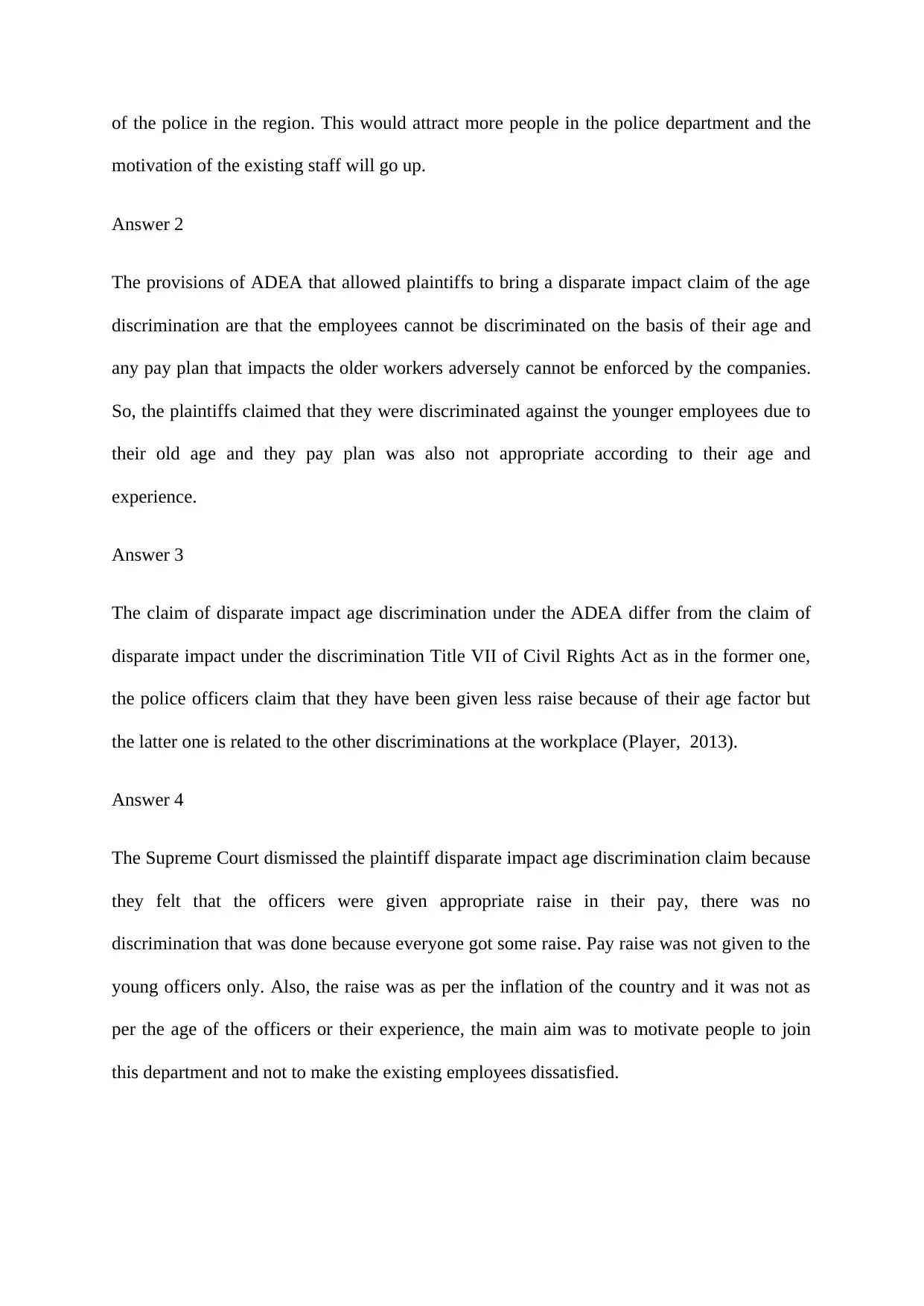
of the police in the region. This would attract more people in the police department and the
motivation of the existing staff will go up.
Answer 2
The provisions of ADEA that allowed plaintiffs to bring a disparate impact claim of the age
discrimination are that the employees cannot be discriminated on the basis of their age and
any pay plan that impacts the older workers adversely cannot be enforced by the companies.
So, the plaintiffs claimed that they were discriminated against the younger employees due to
their old age and they pay plan was also not appropriate according to their age and
experience.
Answer 3
The claim of disparate impact age discrimination under the ADEA differ from the claim of
disparate impact under the discrimination Title VII of Civil Rights Act as in the former one,
the police officers claim that they have been given less raise because of their age factor but
the latter one is related to the other discriminations at the workplace (Player, 2013).
Answer 4
The Supreme Court dismissed the plaintiff disparate impact age discrimination claim because
they felt that the officers were given appropriate raise in their pay, there was no
discrimination that was done because everyone got some raise. Pay raise was not given to the
young officers only. Also, the raise was as per the inflation of the country and it was not as
per the age of the officers or their experience, the main aim was to motivate people to join
this department and not to make the existing employees dissatisfied.
motivation of the existing staff will go up.
Answer 2
The provisions of ADEA that allowed plaintiffs to bring a disparate impact claim of the age
discrimination are that the employees cannot be discriminated on the basis of their age and
any pay plan that impacts the older workers adversely cannot be enforced by the companies.
So, the plaintiffs claimed that they were discriminated against the younger employees due to
their old age and they pay plan was also not appropriate according to their age and
experience.
Answer 3
The claim of disparate impact age discrimination under the ADEA differ from the claim of
disparate impact under the discrimination Title VII of Civil Rights Act as in the former one,
the police officers claim that they have been given less raise because of their age factor but
the latter one is related to the other discriminations at the workplace (Player, 2013).
Answer 4
The Supreme Court dismissed the plaintiff disparate impact age discrimination claim because
they felt that the officers were given appropriate raise in their pay, there was no
discrimination that was done because everyone got some raise. Pay raise was not given to the
young officers only. Also, the raise was as per the inflation of the country and it was not as
per the age of the officers or their experience, the main aim was to motivate people to join
this department and not to make the existing employees dissatisfied.
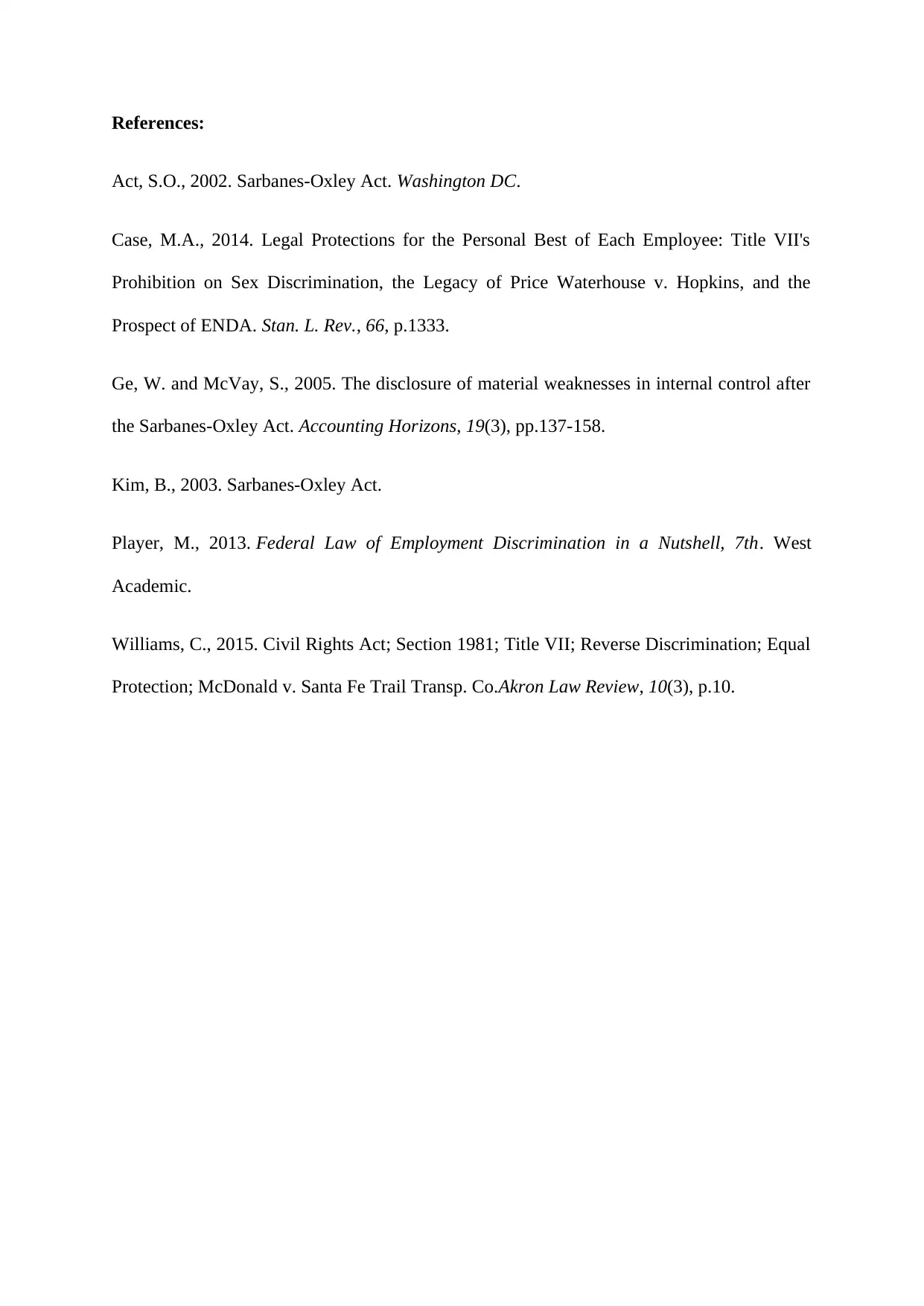
References:
Act, S.O., 2002. Sarbanes-Oxley Act. Washington DC.
Case, M.A., 2014. Legal Protections for the Personal Best of Each Employee: Title VII's
Prohibition on Sex Discrimination, the Legacy of Price Waterhouse v. Hopkins, and the
Prospect of ENDA. Stan. L. Rev., 66, p.1333.
Ge, W. and McVay, S., 2005. The disclosure of material weaknesses in internal control after
the Sarbanes-Oxley Act. Accounting Horizons, 19(3), pp.137-158.
Kim, B., 2003. Sarbanes-Oxley Act.
Player, M., 2013. Federal Law of Employment Discrimination in a Nutshell, 7th. West
Academic.
Williams, C., 2015. Civil Rights Act; Section 1981; Title VII; Reverse Discrimination; Equal
Protection; McDonald v. Santa Fe Trail Transp. Co.Akron Law Review, 10(3), p.10.
Act, S.O., 2002. Sarbanes-Oxley Act. Washington DC.
Case, M.A., 2014. Legal Protections for the Personal Best of Each Employee: Title VII's
Prohibition on Sex Discrimination, the Legacy of Price Waterhouse v. Hopkins, and the
Prospect of ENDA. Stan. L. Rev., 66, p.1333.
Ge, W. and McVay, S., 2005. The disclosure of material weaknesses in internal control after
the Sarbanes-Oxley Act. Accounting Horizons, 19(3), pp.137-158.
Kim, B., 2003. Sarbanes-Oxley Act.
Player, M., 2013. Federal Law of Employment Discrimination in a Nutshell, 7th. West
Academic.
Williams, C., 2015. Civil Rights Act; Section 1981; Title VII; Reverse Discrimination; Equal
Protection; McDonald v. Santa Fe Trail Transp. Co.Akron Law Review, 10(3), p.10.
⊘ This is a preview!⊘
Do you want full access?
Subscribe today to unlock all pages.

Trusted by 1+ million students worldwide
1 out of 6
Related Documents
Your All-in-One AI-Powered Toolkit for Academic Success.
+13062052269
info@desklib.com
Available 24*7 on WhatsApp / Email
![[object Object]](/_next/static/media/star-bottom.7253800d.svg)
Unlock your academic potential
© 2024 | Zucol Services PVT LTD | All rights reserved.
